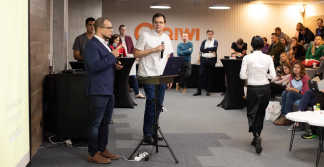



Model explaining anomalies in QIWI transactions

Data analysis
About client

QIWI is a popular electronic payment system.
With the help of QIWI wallet users are able to make transfers amoung themselves, pay bills, and make online purchases

QIWI provides acquiring services to businesses.
Acquiring is a technology that allows companies to accept non-cash payments.








Payment passed or not



The main quality indicator in acquiring is conversion.
Payment failed - the client is dissatisfied
We try and prevent that from happening







On the side of the acquiring system
A payment error can be:



On the provider side
On the side of banking systems






There was a instants where for one mobile user account credits did not work between 1-3 am - its turned out the user had their time zones incorrectly set
Our task
Identify signs of anomalies which cause payments to fail

Scheme of work

What we did:
We looked at transaction data, looked for patterns.

September - November 2018
Hypothesis:
With a fictitious wooden toy store, transactions will be more successful than with a fictitious online casino
The customer could offer different acquiring prices depending on the likelihood of the success of the transaction
We had trouble verifying transactions becasue the customer restricted the provider company information due to security protocol



Technologies

Classic Data Science


Project team



Sergey Verentsov
Developer
Ramil Gizatullin
Developer
Technical solution











Received dumps of QIWI databases in PostgreSQL system
Collected preliminary markup from databases
Processed data using Python
Built a decision tree
You can go through it and see what set of features leads to unsuccessful transactions.
Clustered by provider group




Each node is a condition for a sign of a transaction


Orange nodes are where many transactions have failed.
Development difficulties





Limited access to data
Complexity of the subject area
No guarantees of meaningful results
Communication problems






For example, feature importance is familiar to datasets, while analysts are more familiar with correlations and funnels.
Results of the project

Confirmed the client's hypotheses:









One user tried to put 3.5 billion rubles on the phone.
Of course, nothing came of it.
Of course, nothing came of it.
Transactions with large amounts with a high probability will not pass
There are problematic providers and provider groups
Unfortunately, there was no «magic pill» to fix one problem and transactions will grow. But extra confirmation is always good.
Quote
What the project gave us






Learned to plan better
Understood the importance of working closely with the client
For a week we worked in Innopolis together with a QIWI analyst, exchanged competencies.
In 2019 we took part in Product Hub QIWI Universe 3.0

Georgy Konnov,
Head of QIWI Cashier, one of the business customers of the program
«... As a result, with the EORA team, we made a data analytics case, during which we analyzed the work of our providers and were able to identify new factors that reduce the conversion of payments. Working with them will lead to an increase in the turnover of our partners.»
Emotions from the project



«It was a unique experience for our data scientists: we got financial data on transactions that are not available in other ways. The volume of data was very large, and a whole infrastructure had to be deployed for them.
We worked side by side with specialists from QIWI, learned how the processes inside the corporation are arranged, learned how to interact with the security service.»
We worked side by side with specialists from QIWI, learned how the processes inside the corporation are arranged, learned how to interact with the security service.»
CEO EORA
Roman Doronin



Contact us




